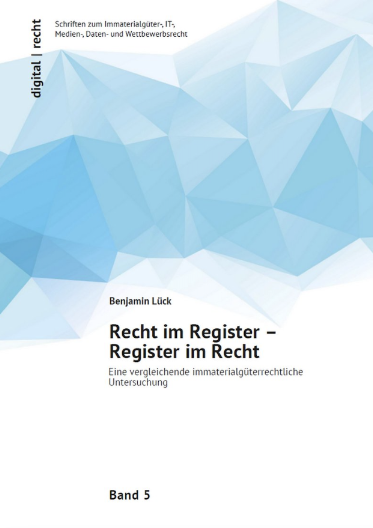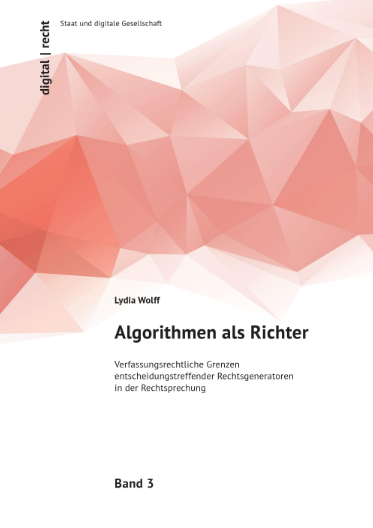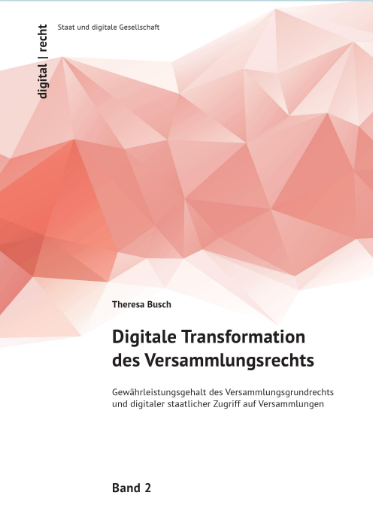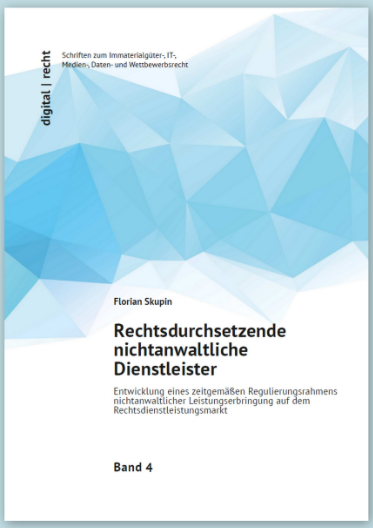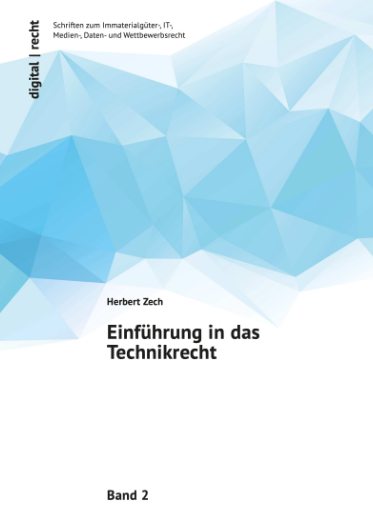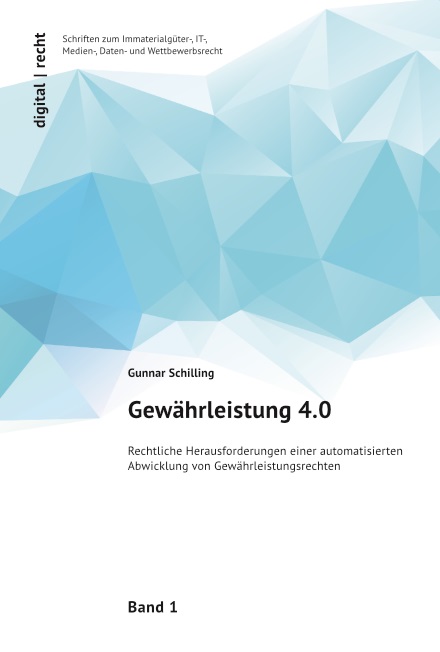Overview
The publication series supported by the IRDT publishes outstanding dissertations and other scientific publications within the subject area of the series by means of Diamond Open Access.
The publication series ensures visibility through a clear focus in terms of content, a distinguished editorial board and strict quality requirements. The cooperation with the Trier University Library and the German National Library ensures the permanent availability of the publications. Thanks to the cooperation with a print-on-demand publisher, the dissertations may also be ordered as classically printed works in good quality.
Publications on Intellectual Property, IT, Media, Data and Competition Law
(published by Prof. Dr. Max Becker, Prof. Dr. Katharina de la Durantaye, Prof. Dr. Franz Hofmann, Prof. Dr. Ruth Janal, Prof. Dr. Anne Lauber-Rönsberg, Prof. Dr. Benjamin Raue, Prof. Dr. Herbert Zech)
Volumes
The State and the Digitalised Society
(published by Prof. Dr. Matthias Bäcker, Prof. Dr. Roland Broemel, Prof. Dr. Thomas Burri, Prof. Dr. Albert Ingold, Prof. Dr. Antje von Ungern-Sternberg, Prof. Dr. Silja Vöneky)
Volumes
Trier Studies on Digital Law
(published by Verein für Recht und Digitalisierung e.V. (VRD))
Volumes
Recht im Register – Register im Recht, Benjamin Lück
Der fünfte Band unserer zivil-rechtlichen Open Access Schriftenreihe ist erschienen. Er enthält die Dissertationsschrift von Benjamin Lück mit dem Titel: "Recht im Register - Register im Recht. Eine vergleichende immaterialgüterrechtliche Untersuchung". Die menschliche Entscheidungsgewalt wird durch algorithmische Entscheidungssysteme herausgefordert. [...]
Algorithmen als Richter, Lydia Wolff
Der dritte Band unserer öffentlich-rechtlichen Open Access Schriftenreihe (Staat und digitale Gesellschaft) ist erschienen. Er enthält die Dissertationsschrift von Lydia Wolff mit dem Titel: "Algorithmen als Richter: Verfassungsrechtliche Grenzen entscheidungstreffender Rechtsgeneratoren in der Rechtsprechung". […]
Digitale Transformation des Versammlungsrechts, Theresa Busch
Der zweite Band unserer öffentlich-rechtlichen Open Access Schriftenreihe (Staat und digitale Gesellschaft) ist erschienen. Er enthält die Dissertationsschrift von Theresa Busch, Universität Mainz, mit dem Titel: "Digitale Transformation des Versammlungsrechts: Gewährleistungsgehalt des Versammlungsgrundrechts und digitaler staatlicher Zugriff auf Versammlungen". Die Arbeit untersucht die Auswirkungen der Digitalisierung auf das Versammlungsrecht. […]
Rechtsdurchsetzende nichtanwaltliche Dienstleister, Florian Skupin
Wie sollten nichtanwaltliche Leistungsangebote – Inkassodienstleistung, Prozessfinanzierung und gewerblicher Ankauf von Forderungen – auf dem durch „Legal Tech“ im Wandel befindlichen Rechtsdienstleistungsmarkt reguliert werden? Dem Verständnis responsiver Rechtsdogmatik folgend untersucht Florian Skupinmit einem ganzheitlichen und multidisziplinären Ansatz unter Einsatz von empirical legal research, wie ein zeitgemäßer und kohärenter Regulierungsrahmen nichtanwaltlicher Leistungserbringung auf dem Rechtsdienstleistungsmarkt aussehen kann. […]
Fernkontrolle im Internet der Dinge, Hanno Magnus
Gestern erschien der dritte Band unserer zivilrechtlichen Open Access Schriftenreihe. Das Buch „Fernkontrolle im Internet der Dinge“ von Hanno Magnus schlägt eine Auslegung des ab dem 1.1.2022 geltenden Rechts vor, die den Herstellern Transparenzpflichten auferlegt, eine Einzelfallkontrolle beim Einsatz von Fernkontrolle erlaubt und die Umgehung der Fernkontrolle von deren Rechtmäßigkeit abhängig macht. […]
Einführung in das Technikrecht, Herbert Zech
Heute erscheint der zweite Band unserer zivilrechtlichen Open Access Schriftenreihe. Diesmal aus dem Herausgeberkreis. Das Buch „Einführung in das Technikrecht“ von Prof. Dr. jur. Dipl. Biol. Herbert Zech will eine Einführung in das faszinierende Rechtsgebiet des Technikrechts geben. Das Buch will eine Einführung in das faszinierende Rechtsgebiet des Technikrechts geben. [...]
Regulierung nutzergenerierter Inhalte auf sozialen Netzwerken, Eva Skobel
Die Kommunikationsstandards sozialer Netzwerke und staatliche Sperrpflichten sind ein aktuelles Thema, das die Rechtswissenschaft in den letzten Jahren verstärkt beschäftigt hat. Die Arbeit stellt den Zusammenhang zwischen den Standards und der Haftung sozialer Netzwerke dar. Sie erläutert Anforderungen an Gemeinschaftsstandards, die im Wege der Drittwirkung die Grundrechte der Nutzer zu beachten haben, und stellt einfachrechtliche Ansatzpunkte zu ihrer Durchsetzung dar. [...]
Gewährleistung 4.0, Gunnar Schilling
Ist das bestehende Rechtssystem auf technischen Fortschritt vorbereitet? Diese Frage stellt sich unweigerlich mit dem Aufkommen neuer technischer Möglichkeiten. Dies gilt auch für die automatisierte Rechtsdurchsetzung. Sogar eine vollautomatisierte Abwicklung der Gewährleistungsrechte ist keine Utopie mehr. Schon heute ermöglichen vernetzte Maschinen die Automatisierung ganzer Geschehensabläufe. [...]



